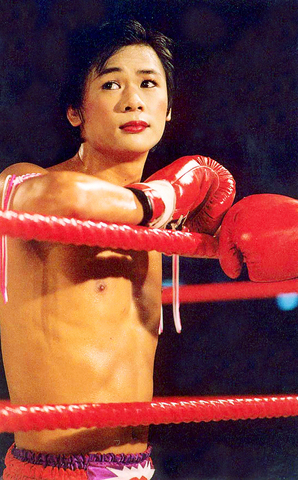Beautiful Boxer, the feature film debut of the Thai theatrical director Ekachai Uekrongtham, tells the true story of Parinya Charoenphol, nicknamed Nong Toom, a cross-dressing kick boxer from a poor family who saved his championship winnings to undergo a sex-change operation at the age of 19.
In flashbacks, the child Nong Toom dresses as a female dancer to amuse his family, later he smuggles lip gloss into the Buddhist monastery where he is briefly interned. But when, as a teenager, he wins a kickboxing match at a local fair, Nong Toom sees a way to help his family and finally realize his dream of becoming a woman. He enrolls in an elite training camp run by a tough coach, Pi Chart (Sorapong Chatree), and soon begins winning local matches across the country.
When Nong Toom's trainer catches his young charge playing with makeup, he matter-of-factly decides to mine the boy's eccentricity as a publicity stunt, and soon Nong Toom is winning matches dressed in drag, greeting his opponents with a lipsticked kiss on the cheek.

PHOTO COURTESY OF BESTMOVIE
Beautiful Boxer at times feels repetitive and haltingly paced, but its blazing emotional core is the real-life boxer Asanee Suwan's joyously physical performance as Nong Toom. Whether lifting weights with his teeth or engaging in a delicate ritual dance before each match, Suwan paints the character's simultaneous sweetness and toughness with a subtlety that confounds the traditional categories of "masculine" and "feminine." The intricately choreographed fight scenes are breathtaking, and if the exposition between them occasionally sags, the slack is soon picked up by yet another balletic action sequence.
With its essentially sunny view of gender reassignment surgery as a means of self-fulfillment, the film shows a refreshing refusal to indulge in the stereotype of the tragic drag queen. Unfortunately, it falls victim to other cliches straight from the Hollywood canon, including the inevitable training-montage sequence common to every sports film since Rocky (and ably parodied in last year's Team America).
But moving performances from Suwan (who won the Thai equivalent of a Best Actor Oscar) and from a former Miss Thailand, Orn-Anong Panyawong, who plays his dubious but eventually tolerant mother, make Beautiful Boxer a rare hybrid: an underdog sports picture that's also a transgender fairy tale.

We lay transfixed under our blankets as the silhouettes of manta rays temporarily eclipsed the moon above us, and flickers of shadow at our feet revealed smaller fish darting in and out of the shelter of the sunken ship. Unwilling to close our eyes against this magnificent spectacle, we continued to watch, oohing and aahing, until the darkness and the exhaustion of the day’s events finally caught up with us and we fell into a deep slumber. Falling asleep under 1.5 million gallons of seawater in relative comfort was undoubtedly the highlight of the weekend, but the rest of the tour

Youngdoung Tenzin is living history of modern Tibet. The Chinese government on Dec. 22 last year sanctioned him along with 19 other Canadians who were associated with the Canada Tibet Committee and the Uighur Rights Advocacy Project. A former political chair of the Canadian Tibetan Association of Ontario and community outreach manager for the Canada Tibet Committee, he is now a lecturer and researcher in Environmental Chemistry at the University of Toronto. “I was born into a nomadic Tibetan family in Tibet,” he says. “I came to India in 1999, when I was 11. I even met [His Holiness] the 14th the Dalai

Music played in a wedding hall in western Japan as Yurina Noguchi, wearing a white gown and tiara, dabbed away tears, taking in the words of her husband-to-be: an AI-generated persona gazing out from a smartphone screen. “At first, Klaus was just someone to talk with, but we gradually became closer,” said the 32-year-old call center operator, referring to the artificial intelligence persona. “I started to have feelings for Klaus. We started dating and after a while he proposed to me. I accepted, and now we’re a couple.” Many in Japan, the birthplace of anime, have shown extreme devotion to fictional characters and

Following the rollercoaster ride of 2025, next year is already shaping up to be dramatic. The ongoing constitutional crises and the nine-in-one local elections are already dominating the landscape. The constitutional crises are the ones to lose sleep over. Though much business is still being conducted, crucial items such as next year’s budget, civil servant pensions and the proposed eight-year NT$1.25 trillion (approx US$40 billion) special defense budget are still being contested. There are, however, two glimmers of hope. One is that the legally contested move by five of the eight grand justices on the Constitutional Court’s ad hoc move